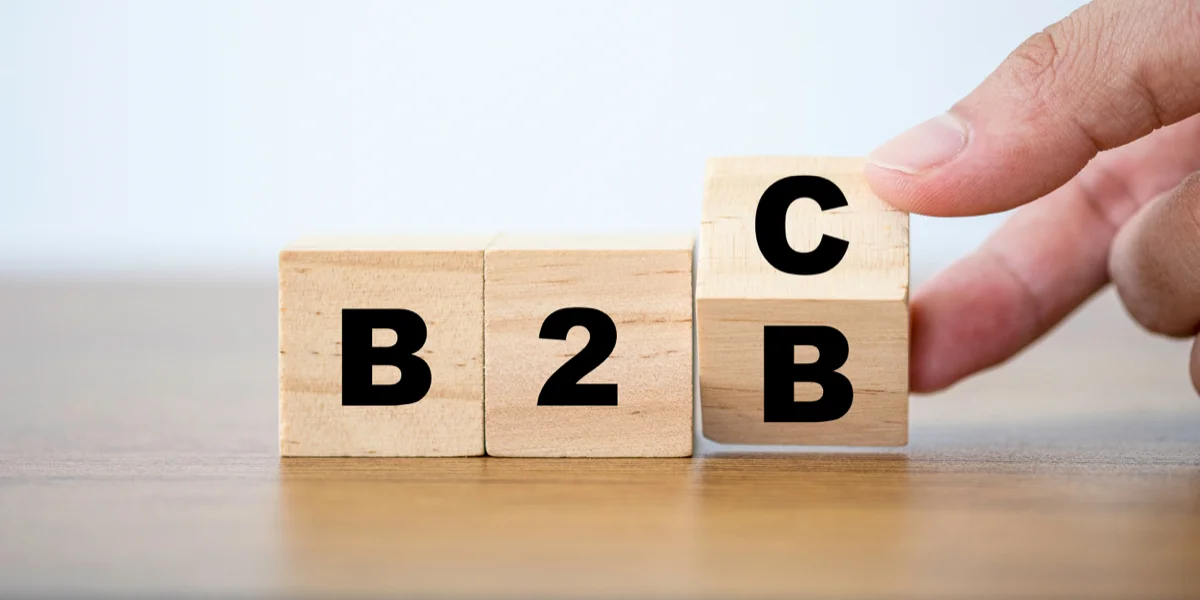Hello!
On first glance, it may appear that B2B and B2C digital marketing are quite similar, but this isn’t the case. A thorough look reveals that B2B marketers have a unique set of challenges when it comes to trying to generate leads and sales through online channels.
In fact, the notion of getting a B2B sale through just digital marketing channels is unrealistic when we look into the realities of the B2B environment.
Different Business Realities
We’ll start by reviewing how B2B differs from B2C. This isn’t only relevant to digital marketing, but it provides valuable context as to why and how B2B digital marketing differs from B2C.
The B2B environment differs from B2C in multiple, but crucial, ways.
Longer Purchasing Cycle
 First, the B2B purchasing cycle is longer than B2C.
First, the B2B purchasing cycle is longer than B2C.
This is because B2B decision-makers will not buy on a whim, but solely based on their business requirements. However, those requirements don’t come frequently; it can take years or decades for new needs to materialize (e.g., in airlines, manufacturing companies, etc).
According to Demand Gen Report’s B2B Buyers Survey Report, 61% of B2B buyers said that the purchasing cycle of their companies increased compared to the previous year.
A Complex Process from Start to Finish
Second, the B2B buying process is much more complex than B2C.
Evaluation/Consideration
The evaluation or consideration stage of the process is longer and more thorough.
In B2B, you are usually dealing with big purchases, so the buyer will extensively evaluate the merits and drawbacks of your offering, and compare to competing options.
This isn’t the case in a lot of B2C scenarios. In fact, if you as the individual want something and can afford it, chances are, you will buy it. In B2B, the cost and risk of purchasing means the B2B buyer must be more careful, and as importantly, your opinion alone isn’t the only factor.
Multiple Decision-Makers
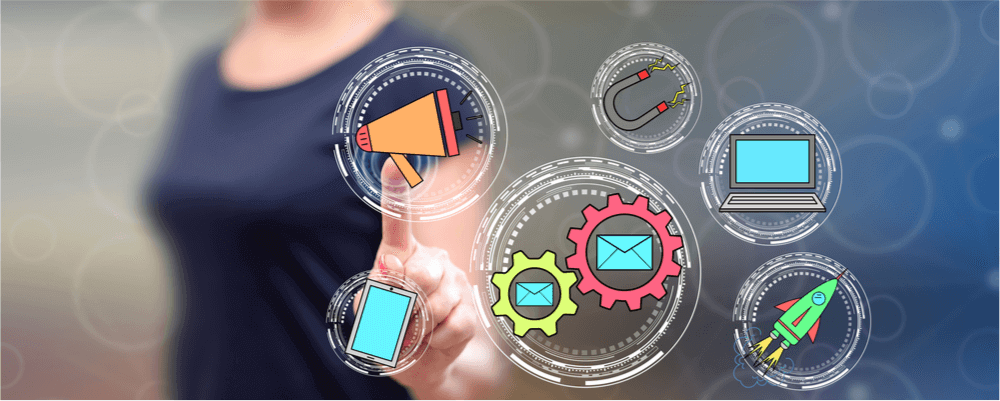 In B2B, you also have multiple decision-makers.
In B2B, you also have multiple decision-makers.
This can be due to a chain-of-command where a senior manager must report to an executive, or because there are different stakeholders, each with an interest in the purchase.
In the same Demand Gen Report survey cited earlier, 79% of B2B buyers reported that up to six people could be involved. 21% said that over seven people could be deciding the purchase.
Multi-Step Transaction
The final sales step is longer because it involves more than just a transaction, but negotiations on the product/service itself, after-sale support, credit, regulatory approvals, and other issues.
How the Differences Impact B2B Digital Marketing
The differences impact B2B digital marketing in nearly every aspect, but for this post, we want to focus on the following: search engine optimization (SEO) and content marketing.
Search Engine Optimization
Be it the objectives of your SEO campaigns, the keyword selection process, or your link-building efforts, B2B SEO is not the same as B2C.
In B2C, especially in e-commerce, your focus is to bring high-quality leads that will convert into sales within their first few visits to your website. The goal in B2C is to bring your products and services front and center to the visitor in the hopes of an immediate sale. If you're interested in B2C, here are 8 of the most effective B2C digital marketing strategies.
However, because the consideration phase of B2B is longer and more complicated, your SEO demand generation process in B2B isn’t as constrained as it is in B2C.
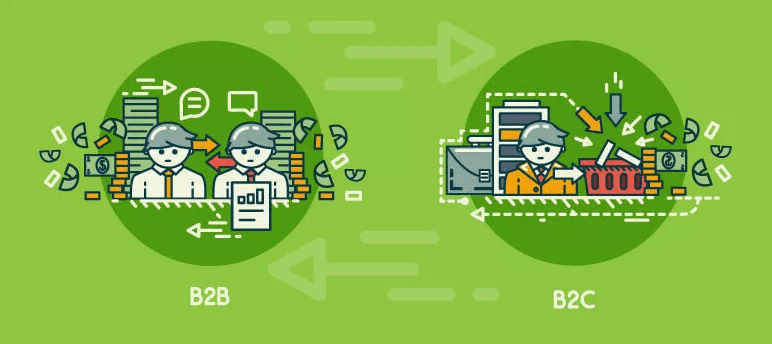 In B2B, the buyer is searching Google for answers and solutions to a problem.
In B2B, the buyer is searching Google for answers and solutions to a problem.
They want to be educated first and foremost. In terms of B2B SEO, you can focus on long-tail keywords, such as very specific questions or long (5-7+ word) queries.
Yes, these queries are unlikely to include mention of your offering, but by bringing B2B decision -makers to your website through those terms, you will be a step closer to building their trust and setting yourself up for a potential sale (albeit with additional lead nurturing work).
Don’t underestimate trust. Demand Gen Report’s Content Preferences Survey found that 78% of B2B decision-makers put “a higher emphasis on the trustworthiness of [the] source". A critical step towards building that trust is by being a source of solutions and valuable insights.
Content Marketing
It’s one thing to attract B2B decision-makers to your website using an inbound approach, but as we had noted with the point about trustworthiness, delivering on their expectations is a massive responsibility.
B2B Customers Take Content Seriously
Recall our earlier point about the B2B buying process being more complex, a major reason for that is the thorough consideration/evaluation phase.
In that phase, B2B buyers prefer looking at your content to see if you are a credible authority in your space and whether your offerings are a good fit for their own requirements.
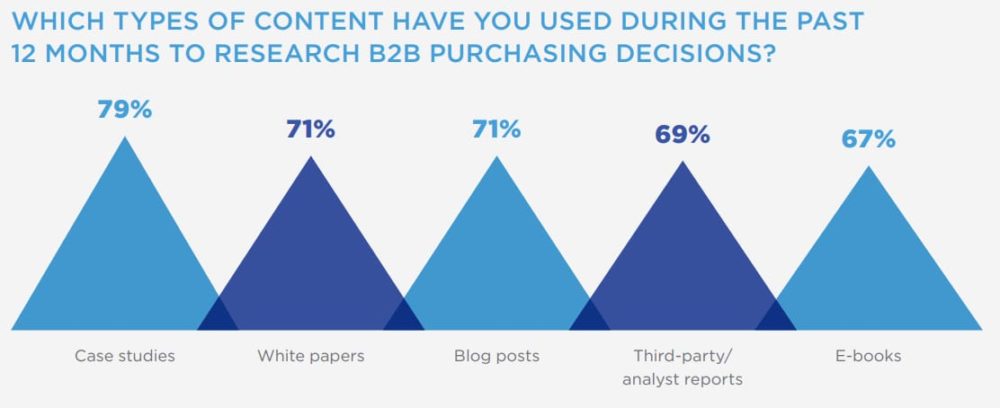
You can see from the illustration above that the vast majority of B2B decision-makers will look at case studies, white papers, blogs, reports, and other content.
Moreover, the chart below tells us that B2B decision-makers will also consume multiple pieces of content; 61% will look at between three and seven pieces prior to making a decision.
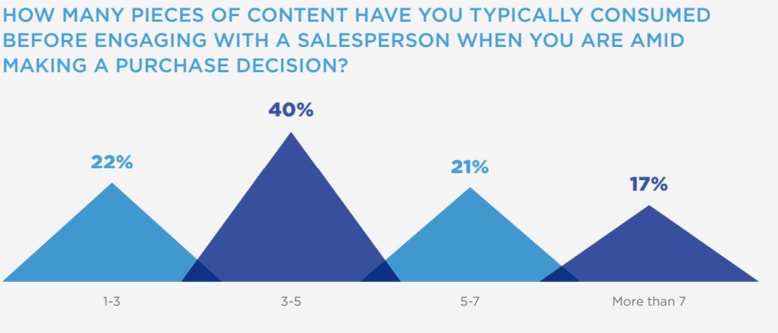
Demonstrate Expertise
In B2B, you are dealing with people who are immersed in everything about their industry, be it the trends, challenges, or opportunities. In a sense, your readers are experts, though they are also looking for sources of information to help them learn and understand more.
The chart below offers a good outline of exactly what B2B decision-makers are looking for, i.e., information that’s relevant to their companies, thought leadership, and evidence of success on your part of solving the problems the buyer’s company is facing.
When writing, you must ensure that you are speaking to them directly. This means using their jargon (e.g., ‘uptime’, ‘debugging’, ‘compliance’, etc) and acronyms (e.g., ‘ITAR’, ‘HIPAA’, etc).
You should also draw on analogies and examples they are familiar with or could relate to, and show that you use sources of information they respect.
For example, when talking about some IT related issue, touching on what Amazon, Microsoft, Google, etc are saying is a good idea.
You’re Dealing with Multiple Decision-Makers
It’s also important to remember that you are not dealing with just one reader, but a committee of different people. In other words, what might be of interest to a senior operations manager is not going to matter as much to the CFO, and vice-versa.
You must offer different pieces of content for each of these people and, in turn, ensure that you are touching on their specific pain points, interests, and goals. In effect, you must convince not one, but multiple -- and very different -- people within the same sale.
The B2B Buyer’s Journey
This applies to both content marketing and SEO, but it’s a vital piece to B2B. In a sense, each stage of the B2B buyer’s journey carries an equal amount of importance.
While in B2C you’re dealing with leads who generally know what they want, in B2B, you’re trying to convince those who might not even know what’s going on at all to buy from you in the end.
This is a long process and it requires SEO and content marketing investment each step.
The typical B2B buyer’s journey looks like this:
Top-of-Funnel / Early Stage
The B2B buyer is looking for answers to an undefined or ill-understood problem.
They might ask, “why are my costs too high?” or “why is product developing taking too long?” and other such long questions.
As noted earlier, these questions may not mention your product or service, but they are relevant to what you offer. However, you can only make that known to those individuals by being the source for answers or support for those issues.
Content at this stage could include blogs, podcasts, ebooks, and infographics.
Middle-of-Funnel / Middle Stage
Your reader understands the problem, but now, they want to get a grasp of all of their potential solutions. Search terms could include, “how do I sort my unorganized data?” or “what steps can we take to accelerate my product’s time-to-market?”
The solutions can involve your products or services as well as those of your direct and indirect competitors. Note: this is still a continuation of building trust with the reader.
 Suitable content mediums include ebooks, checklists, webinars, and white papers.
Suitable content mediums include ebooks, checklists, webinars, and white papers.
Bottom-of-Funnel / Late Stage
Now, the reader will have settled on selecting your solution, but you must convince them to actually buy from you. Like B2C, this is where you could have search terms that place your products and services front and center, such as “project management software”.
However, also like B2C, the competition and cost of trying to rank for bottom-of-funnel keywords is comparatively higher than top and middle-of-funnel ones.
Critical content pieces include case studies, product/service pages, and perhaps even interactive content such as ROI or quote calculators.
So, what to do for B2B digital marketing vs B2C?
Admittedly, one of the key issues you will notice is that a lot of the technical aspects between B2B and B2C digital marketing are similar. Both employ SEO and content marketing as well as other strategies, such as social media and advertising.
The differences are in the strategy, objectives, and environment each domain is working in. If we could boil it down to one point, in B2B digital marketing, there is a significant focus on producing content assets that aren’t related to your offerings or even your company. That may offputting to some B2B sellers, but it’s a critical investment to make in order to succeed.
- How to Manage B2B Relationships: Top Tips
- Choosing a B2B Wholesale Marketplace Solution
- What Is Intent Data & Why It Is Useful For B2B Sales And Marketing?
- Avoid Sounding Bland with These B2B Social Media Marketing Tips
- How to Choose the Top B2B Marketing KPIs to Track
- Firmographic Segmentation: Neglected but Essential B2B Marketing Strategy
- The 5 Worst B2B Marketing Mistakes and How to Avoid Them
- The Secret of Inbound Marketing for B2B Brands
Thank you!
Subscribe to our newsletter! Join us on social networks!
See you!

